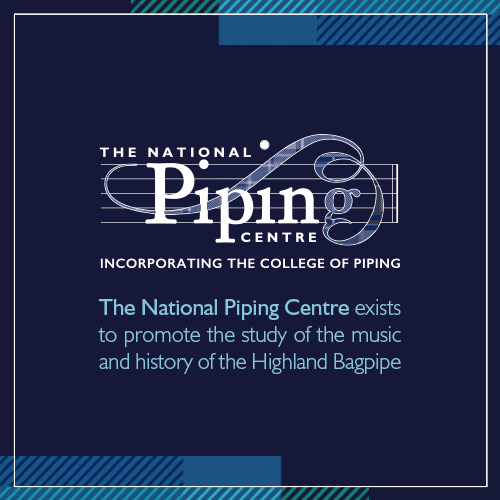
Hugh MacInnes (1949-2002) was one of the leading pipers of the 1970s and 80s. He had an outstanding record in light music and won the Former Winners’ MSR at Oban in 1982, the March in 1976, and the Strathspey and Reel in 1975. At Inverness, he won the March in 1987 and the Strathspey and Reel in 1975. Although he played piobaireachd, having had lessons from John MacFadyen and Donald MacLeod, he never competed in the genre.
He was one of the youngest pipers ever to feature regularly on BBC radio when Seumas MacNeill invited him to take part in BBC Radio Scotand’s Chanter programme (the forerunner of Pipeline). Hugh was aged only 16 at the time. Known for his well-set up instrument, he also won the Jigs at Inverness with a still talked about rendition of John Paterson’s Mare: no tuning of the pipe; twice through; first prize; no problem.
Hugh began piping at the age of 10. He lived in a tenement building in Bell Street near Glasgow Cross. Below the family’s apartment were two yards, one used by the City of Glasgow Police for its police horses and the other by the local authority, Glasgow Corporation.
In order to accustom the horses to loud noises and colourful distraction, pipers from the police pipe band were regularly detailed to report to the yard to play round the stables in full dress. The young Hugh was enchanted by the sight and sounds he absorbed as he leaned out of his bedroom window.
Fortunately for him, working in the adjacent yard was Eddie MacLellan a slater with the Corporation. Eddie was a pupil of two of the most outstanding composers and pipers in the history of our music, John MacColl and Willie Fergusson (Clan MacRae Society Pipe Band) and was a tutor at the College of Piping. Hugh somehow got to know Eddie and began taking lessons during lunch and tea breaks. Eventually, this led to Hugh going of an evening to Eddie’s house for full time instruction. This continued for eight years.

Hugh went on to win all the amateur light music prizes available to him in and around Glasgow. He moved into bands in a big way when he was accepted by Bob Hardie for membership into the Muirhead and Sons Pipe Band. Hugh stayed with the band for two years and in that time developed a respect for Hardie that would stay with him all his life. The respect was mutual. Bob Hardie had a high regard for Hugh’s playing.
After Muirheads, Hugh joined Campbell McGougan’s Lanarkshire Police Pipe Band. The band won every prize in Grades 2 and 3 before amalgamating with the City of Glasgow police force to form Strathclyde Police. Hugh then joined British Caledonian Airways Pipe Band where he was greatly influenced by the late Pipe Major Angus MacDonald MBE, Scots Guards. Later, in 1983, he moved to Toyota Pipes and Drums – the band that was formerly sponsored by Tennent Caledonian Breweries until 1980 when due to a trade recession it was withdrawn – and took the band into Grade 1 before the sponsorship plug was again pulled. An indication of the high regard his pipers and drummers at Toyota had for him came when they laid on a surprise 50th birthday party two years ago.

Hugh returned to B Cal/Power of Scotland and took the band to fifth in the World Championships before quitting the band. Hugh took over the band from Harry McNulty and was Pipe Major from 1992-1994. He then handed over to Roddy MacLeod who was Pipe Major from then until 2006.
After the 1991 season Hugh retired from competitive playing and started to judge more. He was due to take the bench at the 2002 ‘Uist & Barra’ contest when he collapsed and died of a heart attack. He was aged only 52 and had just began a reed-making business that was just about to go into full production. Hugh had no history of ill health or heart problems.
Stuart Shedden, a lifelong friend, piped at the funeral at Daldowie Crematorium, Glasgow, before a large gathering of friends and acquiantances.


